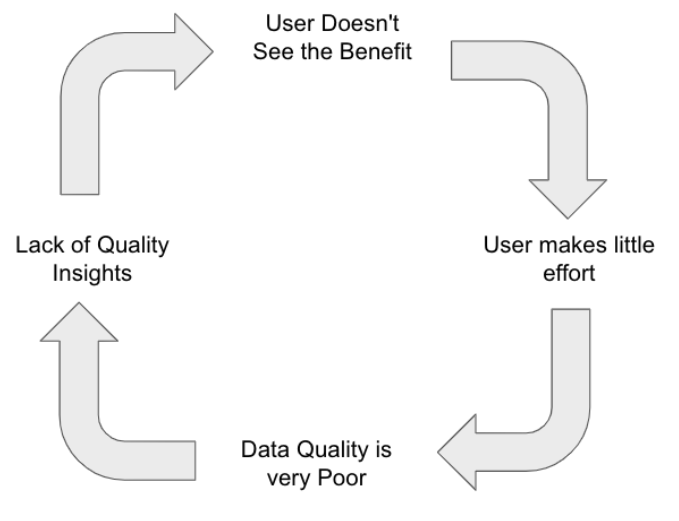Most organisations are well aware of the benefits a well integrated CRM can be. So why do only half of organisations say that everyone uses their CRM? Fine if that is the CEO who doesn’t need to use it everyday, but your service managers? Have you ever heard the following? Oh, I keep a separate spreadsheet to track that as I don’t like using the CRM.
You spent a lot of time and effort on discovery, implementation and had a CRM that was fit for purpose. How about now though? Or next year? How about 2 years later, when the whole implementation team are no longer with the organisation? Who is using the CRM now and what for? Who owns the CRM, is it a specific role or is it multiple people who monitor it?
We have had people contact us about their CiviCRM that we host, asking what it does? New clients ask us what their current CiviCRM can do, maybe they just use it for events. Other clients who have a CiviCRM for one part of the organisation and other departments who are using MailChimp and Eventbrite.
This isn’t specific to CiviCRM. Microsoft Dynamics, Salesforce, Hubspot are all very complex CRMs that can suffer the same way. If you don’t invest in the people who are using your CRM then it will wither over time. In a few years time you will be repeating the same cycle with a new CRM discovery process.
So why does this happen? The adoption challenge is difficult to tackle as it’s not just one problem, it’s a series of problems that feed into each other and create a vicious never-ending cycle.

It doesn’t matter where you join the cycle, you are on the path to low adoption and over time the end of your organisation-wide CRM.
A CRM is not a static thing; rather, it is a complex beast that needs to be constantly supported, maintained, and shaped every day. Changing with your organisation's needs and ensuring that users are central to that change is key to improving adoption.
So how can we improve Adoption?
Demonstrate the software value: Why do you have a CRM, how does it help the organisation, as well as the individual users. If you are capturing data, tell people why you are collecting it. If someone doesn’t see the value of the data then they won’t be engaged in capturing that information.
Break the cycle with good data: So data is poor, it will be worth spending some time and money on cleaning the data. Or maybe creating new data sets and using those going forward. Review all the data you have and why you are capturing it.
Simplify data collection and entry: Does your data capture device have lots of information that is hardly ever required? Well remove them. Or use conditionals to only display information that is relevant to the task at hand. Sometimes multiple forms are better than one form trying to do everything.
Get user feedback and act on it: This seems obvious, but how many times have you asked for feedback but for one reason or another you don’t make those changes. Now there might be good reasons for not making the change. However, did you go back to the staff member and tell them those reasons? If a user's suggestion is implemented, tell people! You Said, We Did announcements can be really powerful at improving engagement.
Training: At the beginning of any CRM implementation there is always some training delivered by the software provider, though ask yourself this. Have you delivered any training recently? Are there people in your organisation now that have NEVER had any formal training in your CRM?
Supposedly Henry Ford said this:
What if we train them and they leave? What if we don’t and they stay?
Whether he said it or not the sentiment remains the same, training is key!
A CRM Owner: I left this to last for a reason. This is the area that we find is the biggest challenge. Who has overall responsibility for the system? Who makes the decisions on what data to capture and how it is done? This role can help support and deliver all of the above. Someone who understands the database and why it is set up in the way that it is. They can also support the organisation with delivering training and getting feedback quickly. A good CRM owner is the difference between a successful CRM and one that withers.
One of our challenges is when a project owner who has successfully delivered the new CRM leaves. Their replacement, if there is one, has no experience with the CRM and usually this isn’t even in their job description.
So? Who owns your CRM?
Check out our other blog on How to get the best out of your CRM
Investment in your CRM means investing in the people using it. If you don’t, then at some point you are going to be investing in a new one. Where there is always someone ready to take your call and the cycle begins again.
Our number is…..

